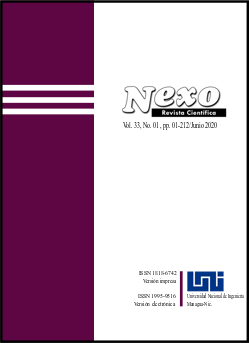Effect of Cocos nucifera and Jatropha gossypiifolia oils on the asphaltenes stability
DOI:
https://doi.org/10.5377/nexo.v33i01.10044Keywords:
Asphaltenes, Flocculation, Stability, Dispersion, Cocos nucifera, Jatropha gossypiifoliaAbstract
The objective was to evaluate Cocos nucifera and Jatropha gossypiifolia oils as asphaltene stabilizers in a medium crude oil from Campo El Furrial Estado Monagas, Venezuela. Two samples were used for each oil, one of which was heated to 140 °C for 24 hours. Three mixtures were prepared for each diesel oil (30, 40, and 50%). Eight μl were applied from each mixture to 10 ml of petroleum and the flocculation threshold (UF) of asphaltenes was obtained as the ml of n-heptane applied to observe aggregates in an optical microscope and the dispersion point (PD) as the ml of xylene to solubilize the asphaltene aggregates formed. The Instability Index (INE) represents the relationship between UF and PD. The experimental design was factorial with a response variable (INE) and 3 experimental factors (Type of Oil, Temperature and Percentage of Oil). The package Statgraphics Centurion XVII was used with α = 0.05. Experimental factors and their relationships significantly influence the stability of asphaltenes in the oil used. Both oils stabilize the asphaltenes, their performance being better when heated to 140 °C and that of J. gossypiifolia was the most efficient with 71.89%.
Downloads
974
Downloads
Published
How to Cite
Issue
Section
License
The authors who publish in Nexo Scientific Journal agree to the following terms:
- Authors retain the copyright and grant the journal the right of the first publication under the license Creative Commons Attribution License, which allows others to share the work with a recognition of the authorship of the work and the initial publication in Nexo Scientific Journal.
- Authors may separately establish additional agreements for the non-exclusive distribution of the version of the work published in the journal (for example, in an institutional repository or a book), with the recognition of the initial publication in Nexo Scientific Journal.
- Authors are allowed and encouraged to disseminate their works electronically (for example, in institutional repositories or in their own website) before and during the submission process, as it can lead to productive exchanges, as well as earlier and greater citation of published works.










